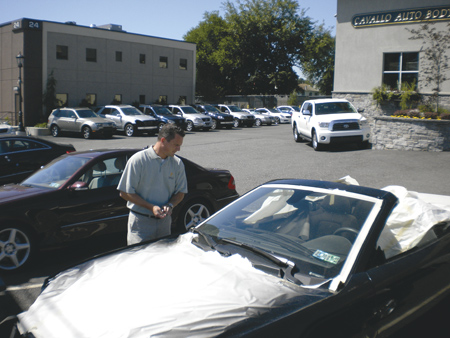Profits in the auto glass business have been ground down in recent years, a victim of insurance companies and standard rating services. While some shops simply don’t do glasswork, others are trying – successfully – to hang on.
One thing is crystal clear: A combination of factors is making it tough for body shops to offer the quality of service they know their customers expect. But with sufficient management, a profit still can be made.
“This is an issue that needs to be addressed – not so much from the shop’s profit point of view but a customer safety point of view,” says Rick Larsen, body shop manager at Knauz Collision Repair Center in Lake Bluff, Ill., a 35,000-square-foot shop serving a high-end group of dealerships including BMW, Mercedes-Benz, Mini, Land Rover, Smart Car and Hyundai.
Larsen says he regularly sees customers who had a glass installation done by someone who didn’t do the work correctly. “Then they want us to look at it,” he says. He finds the failure rate is “worse than 80 percent” of the jobs he re-inspects. Not only do added features like rain sensors and shading glass add complications to the job, but the basic installation often is blown.
“It needs to be understood that glass is a structural part of the car,” Larsen says. “Right now, in too many cases, it isn’t being put in properly.”
Larsen could sign up a small army of supporters.
“What comes on the car belongs on the car,” says Steve Mugler, manager of Cavallo Auto Body’s Newtown Square, Pa., location.
In addition to concerns about installation, Mugler worries about the quality of the glass in windshields that aren’t OEM product.
“Who knows how resistant it is to a stone thrown up off the highway?” he asks.
“Insurance companies love to say they’ll restore your car to pre-accident condition,” Mugler continues. “But pre-accident, your car didn’t have aftermarket glass.” Since it’s a structural part of the vehicle, he wants to install glass that’s certified as an OEM part.
John Fackler, president of Hogg Collision and Auto Glass in Toledo, Ohio, runs a general body shop that’s still strong in the glass business and making money at it.
“Customers want me to do the work. They trust me,” he says. “I don’t see any reason to walk away from any business. You’re giving money away if you don’t keep it in-house.”
Fackler cringes at the idea of surviving on $40 to put in a windshield.
“I’d never make it strictly as a glass shop,” he admits. “If I were just doing glass, I’d be starving to death.”
But he sees a steady stream of customers, many of whom are referred by other customers who are clients from the past 40 years. Some of them come in and ask whether he can do a job for a certain amount of money. If he can give them a quality repair within their budget, he takes the business.
Most important to Fackler’s success is that he has a source for glass that gives him good quality at a reasonable price. “I know my source,” he says. This allows him to stay away from some of the flimsy products on the market.
Cavallo Auto Body serves a top-end clientele, so Mugler has no room to cut corners. He finds his customers don’t resist paying an extra $100 out-of-pocket to get a job done right.
“It’s a matter of how you sell the customer,” he says. “If you relay the situation to them properly, sell it to them, and explain that both my installer and I guarantee the product, they can see that it’s worth the extra money today to avoid being inconvenienced down the road.”
But glass is not a run-of-the-mill job at Cavallo. “We do it more as a courtesy to our regular customers,” Mugler says. He says they simply cannot concede to the discounted rates that they would have to charge if they bowed to outside shops. “They’re unbelievably low,” he says.
Most customers patronizing Cavallo’s three locations are professionals with fine vehicles.
“When I do glass for a customer, the customer is paying something out of pocket,” Mugler says.
But his clientele is sophisticated enough and busy enough to want the job done right and to have vehicles that look good at the law office or the country club parking lot.
Other body shops have simply conceded that glass isn’t a business in which they want to compete.
Brady Jacobson, owner of Shaller-Jacobson Collision & Alignment Repair Specialists in La Crosse, Wis., says his shop sublets the work out, but the key was finding someone he could trust to do the job correctly.
“I think (the glass business) is awfully controlled and dictated to by the insurance companies,” Jacobson says.
His solution would be to get back to basic capitalism and let consumers choose the repair shops they want to use. “Consumers will pick the better shops and they will get a better quality job,” Jacobson says.
Tom Menze, owner of In-Line Collision Repair in York, Neb., does some of his own glass work but mainly farms it out. They’ve been using outside service techs for about five years.
In-Line serves a rural community. Better than half the glass work they see is a result of collision jobs, but they do see their share of starred windshields. Menze developed a relationship with a couple of companies that put in quality glass and do a quality job.
“I cannot compete with the others – they use extremely cheap glass,” Menze says. “But you get what you pay for.”
At Knauz Collision Repair Center, there’s a 30- to 70-percent split of techs who do their own glass work. “I can’t throw glass at a car for $25 a pop,” Larsen says.
BMW is one OEM that wants to compete in the glass market. In mid-July, it did a conference call with body shops to determine what it could do to retain a higher portion of the auto glass business.
Trying to Compete
Glass prices are set by the National Auto Glass Specifications, or NAGS, which is owned by Mitchell International. The company owns the rights to the NAGS glass list pricing and parts numbering systems, sells relevant books and manuals, and effectively sets list prices. To combat this, insurance companies demand deep discounts to the NAGS list prices.
“I cannot do a job for what NAGS says,” Mugler says.
“It takes a college degree to figure NAGS,” Larsen adds.
Insurance companies have their own glass installers who work on volume, not margin. Depending on the shop’s location and the amount of competition, it can be easier or tougher to fight the discount battle.
“The problem is that it’s a roll of the dice (for the insurance companies),” Larsen says. “If you can get eight of 10 customers to go with the insurance company, then they’re okay. But for them it’s a crap shoot.”
Fackler, too, is frustrated with insurance companies but knows that without insurance, people simply wouldn’t change cracked glass. If he could do one thing to straighten out the business and assure quality, he says he would eliminate direct repairs.
Quality Control
“We don’t have quality issues,” Fackler continues. “My guys are trained.” Plus, he has a high worker retention rate. He buys from a trusted source and gets almost no callbacks. Even though glass is a low invoice job, Fackler figures that in today’s market, every dollar counts. In fact, the only thing he sublets is alignments – this despite the fact he has an alignment machine in-shop.
Shaller-Jacobson uses two local glass firms, which they find do a consistently good job and have quality mindsets.
“We stay away from anyone who uses off-brands,” Jacobson says.
In the rare event that there’s need for a make-good, the customer comes back to the shop – not the installer. “But we almost never have a problem,” Jacobson says.
Menze, too, has developed a relationship with a couple of companies he can trust to put in quality glass and do a quality job. “I cannot compete with the others – they use extremely cheap glass. But you get what you pay for.”
“I wish we could get everyone on an even keel,” Menze continues. He says that when he can tell customers that the big glass companies are making their profits by buying huge volumes of cheap glass, he usually gets the sale.
Mugler makes sure that he personally places the BMW sticker on each completed glass job – his way of assuring the customer that the job is done right.
He’s wary of customers who rely on a third party to provide quality control. Land Rovers, for example, have heated windshields. He’s confident in his relationship with the local Land Rover or Mercedes dealer to get the right information on a vehicle when he provides a VIN for them to look up. The dealer will ask the right follow-up questions to assure the customer gets what’s needed.
“When you rely on a third party, who’s to say they have quality control? Half the people scheduling appointments for aftermarket companies probably don’t even know to ask the customer whether their Land Rover has a heated windshield,” he says.
Mugler tries to avoid re-doing or second-guessing jobs done by other firms even though he has seen too much work, from bumper jobs to glass installations, that he describes as “horrific.”
“It’s a Pandora’s Box,” he says. “And it’s unprofessional to say that we did a superior job.”
On top of that, he’s weary of the insurance hassles: “It’s hard enough to negotiate a claim the first time around. It’s doubly hard to negotiate a re-repair with aftermarket parts.”
Menze, too, sees people who come in with loose molding or scratched glass from a botched job.
“I tell them to go back where they got the job done,” he says. “If we could eliminate the fly-by-night people, that would be a big help in this business.”
Fackler agrees. “The market is solid but not growing,” he says. He sees his glass business as a kind of sample of the work Hogg Collision and Auto Glass does. “Right now is the time for me to establish new contacts and market smarter,” Fackler says. “When the market winds back up, I won’t be so concerned about making $5 or $10 more.”
In short, using glass to get people into the shop will allow him to built a good customer base that will turn a profit in better times.
Curt Harler is a Cleveland-based freelance writer specializing in the automotive, technology and environmental areas. He is the recipient of the International Communications Association Industry Achievement award for his writing. You can reach him at [email protected]. 














